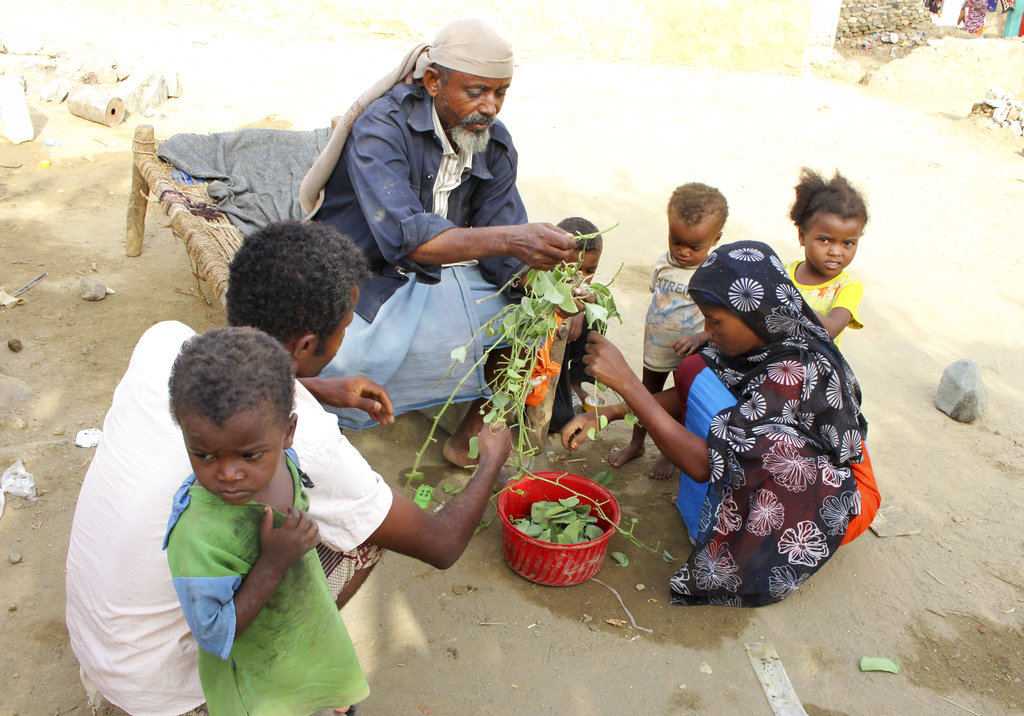UN aid chief: Fight against famine is being lost in Yemen

In this Aug. 25, 2018 photo, a man feeds children Halas, a climbing vine of green leaves, in Aslam, Hajjah, Yemen. Yemenis in the isolated pocket in the north have been reduced to eating boiled leaves from a local vine to stave off starvation, with no aid reaching many families who need it most. The situation in Aslam district is a sign of the holes in an international aid system that is already overwhelmed but is the only thing standing between Yemen’s people and massive death from starvation amid the country’s 3-year civil war. (AP Photo/Hammadi Issa)
UNITED NATIONS — The U.N. humanitarian chief warned Friday that the fight against famine is being lost in Yemen, which is already facing the world’s worst humanitarian crisis with 75 percent of its 29 million people in need of assistance.
Mark Lowcock called the situation “bleak” and told the Security Council it “has deteriorated in an alarming way in recent weeks.”
“We may now be approaching a tipping point, beyond which it will be impossible to prevent massive loss of life as a result of widespread famine across the country,” he said. “We are already seeing pockets of famine-like conditions, including cases where people are eating leaves.”
Lowcock said two recent developments threaten to overwhelm the aid operation — a “dramatic economic collapse” that has reduced the value of Yemen’s currency by some 30 percent, and intensified fighting around the Red Sea port of Hodeida, which is key to deliveries of food, medicine and other vital supplies.
The conflict in Yemen, the Arab world’s poorest country, began with the 2014 takeover of the capital, Sanaa, by Houthi Shiite rebels, which toppled the internationally recognized government. A Saudi-led coalition allied with the government has been fighting the Houthis since 2015.
Article continues after this advertisementCivilians have borne the brunt of the conflict, which has killed over 10,000 people and sparked a cholera epidemic.
Article continues after this advertisementLowcock said that during the first six months of this year, the United Nations and humanitarian groups provided assistance to more than 8 million of the most vulnerable Yemenis who don’t know where their next meal will come. That is a dramatic expansion from 2017, when food was reaching 3 million people a month.
Because almost all Yemenis rely on imported food, Lowcock said, the currency depreciation “translates directly into a sharp increase in the price of food for some 10 million Yemenis” who aren’t getting enough food but aren’t part of the aid operation. There has also been an “unprecedented increases” in the price of fuel, he said.
In addition, Lowcock said, intensified fighting in recent weeks around Hodeida is “choking the lifeline” for getting aid to those in need.
Fighting in recent days has cut the main road from Hodeida to Sanaa, which is the principal conduit for both commercial importers and aid groups for moving supplies, he said. Other routes are heavily damaged, he said.
Lowcock said armed groups have occupied humanitarian facilities, and attacks have resulted in dozens of deaths and serious damage to public health and water facilities as well as other aid infrastructure.
“We estimate that an additional 3.5 million people may soon be added to the 8 million already severely food insecure,” he said.
Lowcock said the U.N. continues to push to scale up its aid operation, but “humanitarian organizations simply cannot look after the needs of all 29 million Yemenis. That is untenable.”
He urged the Security Council to press for immediate measures to stabilize Yemen’s economy and support the exchange rate, including ensuring liquidity for the central bank and implementing longstanding commitments to pay salaries of teachers, doctors, health workers and other public service employees throughout the country.
Lowcock also urged that ports be kept open, warning that “the lifeline through which the aid operation runs now hangs by a thread.”
He called for protection of civilians, schools, hospitals and other civilian infrastructure, the establishment of “an air bridge” for medical evacuations and serious negotiations on “a positive path towards peace.” /muf